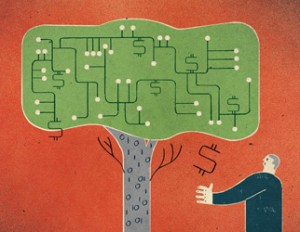Annuities offer security and modest growth
Annuities won't maximize income in retirement. But that doesn't make them a poor choice. Remember, life isn't a spreadsheet. Instead, annuities offer a combination of security and modest growth not available through many other income options.
 There are a lot of people who do not enjoy managing their own money. A recent interview with Sallie Krawcheck (business owner, named to Forbes list of world’s most powerful women, former financial industry leader) was pretty blunt about the fact that she “hates” financial planning. I cannot count the number of times I have had people tell me that they hate their money! Personal money management for most of us is—quite frankly—uninteresting. It’s also threatening. It requires us to look at possible short falls in our finances, a need to modify our lifestyles and to acknowledge death. Even with an extraordinary career in the financial industry, Krawcheck’s admits to the difficulty of discussing the “death” details about finances:
“…I would never have that awkward conversation with my spouse about what happens when one of us dies. I would live to 457 years old before that would happen.”
A recent posting in Everything Zoomer by Gordon Pape got me thinking again about annuities. His advice to a 67-year-old was to delay buying an annuity for a period of time. This would allow for an increase in interest rates that appears likely to happen and for her to be a bit older at time of purchase and therefore receive a larger payout. Financially, this makes sense to maximize the payout, especially since inflation protection needs to be factored in. All too often it seems that estate planning becomes the deterrent to annuities because the annuitized money dies with you. Although this is true I would prefer to see the protection of the assets and therefore the lifestyle of the aging individual as the priority. Some things to consider when annuitizing:
There are a lot of people who do not enjoy managing their own money. A recent interview with Sallie Krawcheck (business owner, named to Forbes list of world’s most powerful women, former financial industry leader) was pretty blunt about the fact that she “hates” financial planning. I cannot count the number of times I have had people tell me that they hate their money! Personal money management for most of us is—quite frankly—uninteresting. It’s also threatening. It requires us to look at possible short falls in our finances, a need to modify our lifestyles and to acknowledge death. Even with an extraordinary career in the financial industry, Krawcheck’s admits to the difficulty of discussing the “death” details about finances:
“…I would never have that awkward conversation with my spouse about what happens when one of us dies. I would live to 457 years old before that would happen.”
A recent posting in Everything Zoomer by Gordon Pape got me thinking again about annuities. His advice to a 67-year-old was to delay buying an annuity for a period of time. This would allow for an increase in interest rates that appears likely to happen and for her to be a bit older at time of purchase and therefore receive a larger payout. Financially, this makes sense to maximize the payout, especially since inflation protection needs to be factored in. All too often it seems that estate planning becomes the deterrent to annuities because the annuitized money dies with you. Although this is true I would prefer to see the protection of the assets and therefore the lifestyle of the aging individual as the priority. Some things to consider when annuitizing:










